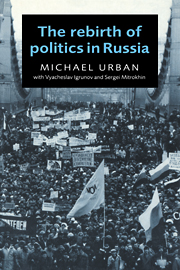Book contents
- Frontmatter
- Contents
- Preface
- Part I The pre-political context
- Part II Perestroika and the return of political life
- Part III Politics and revolution
- 7 The politics of opposition
- 8 The 1990 elections and the politics of national liberation
- 9 Parties in movement: the articulation of Russian political society at the close of the Soviet period
- 10 Restoration and revolution
- Part IV Ground up: politics in post-communist Russia
- Notes
- Index
7 - The politics of opposition
Published online by Cambridge University Press: 22 October 2009
- Frontmatter
- Contents
- Preface
- Part I The pre-political context
- Part II Perestroika and the return of political life
- Part III Politics and revolution
- 7 The politics of opposition
- 8 The 1990 elections and the politics of national liberation
- 9 Parties in movement: the articulation of Russian political society at the close of the Soviet period
- 10 Restoration and revolution
- Part IV Ground up: politics in post-communist Russia
- Notes
- Index
Summary
Contrary to the pattern accompanying transitions from authoritarian rule to democracy that we discussed in Chapter 3 – in which national elections had been followed by a rapid demobilization of popular forces and a de-escalation of political demands – in the Russian case precisely the opposite occurred. In the wake of the 1989 elections, the country was rocked by an explosion of political activity that fundamentally transformed the relations of power within an already shaken communist order and brought millions of people into the political process as active participants. As this post-election mobilization gathered force, leaders of the democratic forces correspondingly altered their strategy. No longer would they attempt to influence the Gorbachev leadership to adopt one or another measure through persuasion; rather, they would oppose that leadership, adopting an increasingly radical posture in so doing. Thus demands to renew the social order were replaced by those to transform it.
How can this departure from the pattern described in the transitions literature be explained? Contextualizing the structural categories used in our earlier discussion of this question, we here call attention to the manner in which the USSR's weak structures rendered the new legislature both unrepresentative and institutionally debilitated. The following section explores these questions from a number of viewpoints, arguing that within the prevailing circumstances publicity, rather than legislative activity, was the single alternative to capitulation facing those returned to office by a sector of the electorate that was already becoming an active mass base for a revolutionary-democratic movement. Through publicity, interaction between democratic leaders and the public spiralled into the creation of a loosely organized national opposition whose objective became the destruction of the communist system in Russia.
- Type
- Chapter
- Information
- The Rebirth of Politics in Russia , pp. 147 - 171Publisher: Cambridge University PressPrint publication year: 1997



